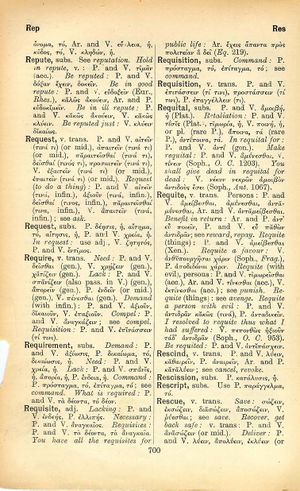requite
ἡ γὰρ συνήθεια δεινὴ τοῖς κατὰ μικρὸν ἐνοικειουμένοις πάθεσι πόρρω προαγαγεῖν τὸν ἄνθρωπον → for habituation has a strange power to lead men onward by a gradual familiarization of the feelings
English > Greek (Woodhouse)
v. trans.
Persons: P. and V. ἀμείβεσθαι, ἀμύνεσθαι, ἀνταμύνεσθαι, Ar. and V. ἀνταμείβεσθαι. Benefit in return: Ar. and P. ἀντʼ εὖ ποιεῖν, P. and V. εὖ παθὼν ἀντιδρᾶν; see reward, repay. Requite (things): P. and V. ἀμείβεσθαι (Xen.). Requite a favour: V. ἀνθυπουργῆσαι χάριν (Soph., Frag.), P. ἀποδιδόναι χάριν. Requite (with evil), persons: P. also V. τιμωρεῖσθαι (acc.), Ar. and V. τίνεσθαι (acc.), V. ἐκτίνεσθαι (acc.); see punich. Requite (things): see avenge. Requite a person with evil: P. and V. ἀντιδρᾶν κακῶς (τινά), P. ἀνταδικεῖν. I resolved to requite thus what I had suffered: V. πεπονθὼς ἠξιοῦν τάδʼ ἀντιδρᾶν (Soph., O.C. 953). Be requited: P. and V. ἀντιπάσχειν.

